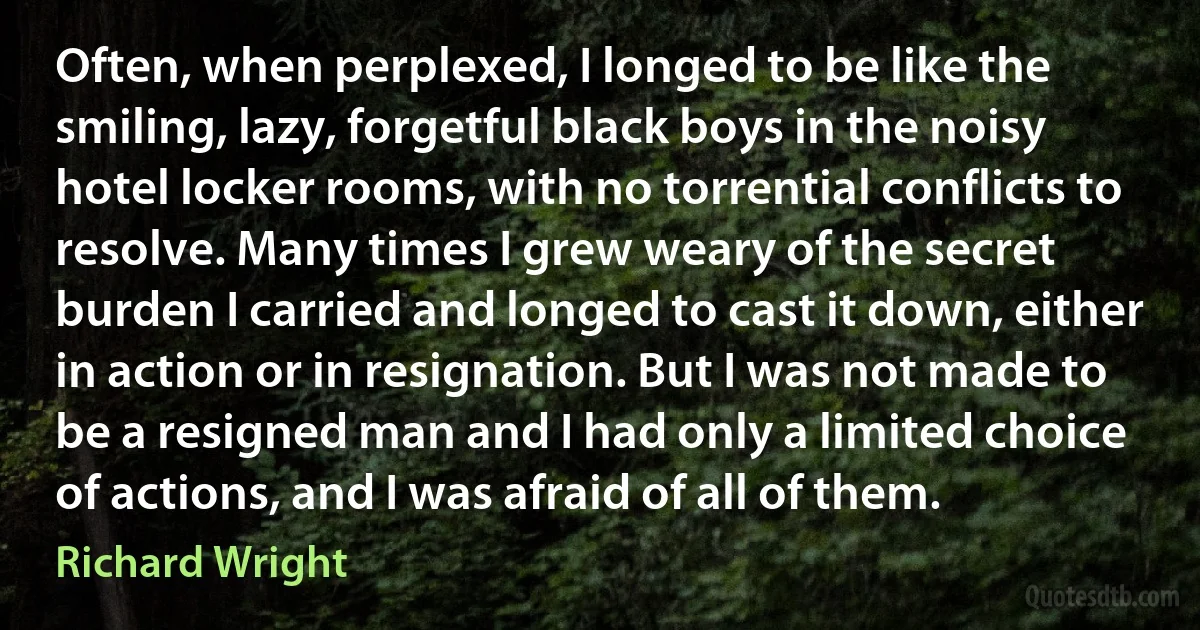Burden Quotes - page 12
I mean artists like Joseph Beuys, who is really a tough, strong artist. B E U Y S. He's been working in Germany for years. He doesn't bother with the burden of ideas. What he desires to do is fill your house with margarine. Let you live encased in fat, die encased in fat. He would take three hundred pounds of margarine and put it exactly where Pat Kelly is now, and then leave it there. That's sort of the tenor of his work.

Carl Andre
As I have said many times, for me an artist is a person who says he's an artist, and an artwork is what an artist says is an artwork. Although for myself, I am not interested in ideas as the burden of art.... the important thing about art is how it stimulates us. I think the more you are stimulated by more different kinds of art, the more demanding you're going to become on the level of your stimulation. The key to art is experience of it and proximity to it.

Carl Andre
Debates on the definitions of culture versus barbarism, or on the question of who is civilized and who is modern are best discussed in the light of Islamic doctrine. Quite significantly, this point must be kept in mind, particularly as a matter of concern to individuals of the educated classes of Islamic societies upon whom lies the burden of responsibility and leadership of the Umma.

Ali Shariati
A vital leap in the evolution of intellectual capacity would have been the ability to form concepts, to conceive of individual objects as belonging to distinct classes, and thus do away with the almost intolerable burden of relating one experience to another. Concepts, moreover, can be manipulated and this is the root of abstract thought and of invention. The formation of concepts is also a necessary, but apparently not sufficient, condition for the emergence of language.

Richard Leakey
If any person had told the Parliament which met in terror and perplexity after the crash of 1720 that in 1830 the wealth of England would surpass all their wildest dreams, that the annual revenue would equal the principal of that debt which they considered an intolerable burden, that for one man of £10,000 then living there would be five men of £50,000, that London would be twice as large and twice as populous, and that nevertheless the rate of mortality would have diminished to one half of what it then was, that the post-office would bring more into the exchequer than the excise and customs had brought in together under Charles II, that stage coaches would run from London to York in 24 hours, that men would be in the habit of sailing without wind, and would be beginning to ride without horses, our ancestors would have given as much credit to the prediction as they gave to Gulliver's Travels.

Thomas Babington Macaulay
My ability to endure tension had now grown amazingly. From the accidental pain of southern years, from anxiety that I had sought to avoid, from fear that had been too painful to bear, I had learned to like my unintermittent burden of feeling, had become habituated to acting with all of my being, had learned to seek those areas of life, those situations, where I knew that events would complement my own inner mood. I was conscious of what was happening to me; I knew that my attitude of watchful wonder had usurped all other feelings, had become the meaning of my life, an integral part of my personality; that I was striving to live and measure all things by it. Having no claims upon others, I bent the way the wind blew, rendering unto my environment that which was my environment's, and rendering unto myself that which I felt was mine. It was a dangerous way to live, far more dangerous than violating laws or ethical codes of conduct; but the danger was for me and me alone.

Richard Wright
I'm an American Negro; as such, I've had a burden of race consciousness. So have these people. I worked in my youth as a common laborer, and I've had a class consciousness. So have these people. I grew up in the Methodist and Seventh Day Adventist churches and I saw and observed religion in my childhood; and these people are religious. I was a member of the Communist Party for twelve years and I know something of the politics and psychology of rebellion.... These emotions are my instruments.... I want to try to use these emotions to try to find out what these people feel and think and why.

Richard Wright
Well did he know how Palms by oppression speed,
Victorious, and the Victors sacred Meed!
The Burden lifts them higher. Well did he know,
How a tame stream does wild and dangerous grow
By unjust force; he now with wanton play,
Kisses the smiling Banks, and glides
But his known Channel stopt, begins to roare,
And swell with rage, and buffet the dull shore.
His mutinous waters hurry to the War,
And Troops of Waves come rolling from afar.
Then scorns he such weak stops to his free source,
And overruns the neighboring fields with violent course.

Abraham Cowley
The declared object of deflation was the restoration of the gold standard at pre-war parity. Its actual effect has been to create unemployment by the restriction of industrial credit. By the lever of unemployment it has forced down wages and has thus facilitated the return to gold through the reduction of prices. An incidental effect has been to transfer purchasing power from the workers, whose wages have been reduced, to the bondholders, whose interest has remained the same. It has also doubled the real burden of Debt since 1920, and was largely responsible for the mining lock-out last year, by the reduction in terms of sterling of the money which we receive for coal sold abroad. Deflation, in fact, has been responsible for a sinister catalogue of disasters which can be substantiated in detailed argument that has never yet been rebutted.

Oswald Mosley
Of late, men seem to have been possessed by an incomprehensible impulse to strip themselves of everything with which nature has endowed them in order to make them superior to the beasts of burden. A philosopher is a gentleman who sits down four times a day to the best meals he can possibly obtain, and who considers that virtue, glory and noble sentiments should be indulged in only when they do not interfere with those four indispensable functions and all the rest of his little personal comforts. At this rate, a mule is a better philosopher by far, because in addition to all this he puts up with blows and hardship without complaint.

Eugène Delacroix
Beware most strictly of any outbursts of emotion which may engender needless complications or any fraternal contention and strike which may create confusion, lead you astray and cause you to lose the confidence of the world.
Let the entire nation continue as one family from generation to generation, ever firm in its faith in the imperishability of its sacred land, and mindful of its heavy burden of responsibility and of the long road before it.

Hirohito


![Upon one of his [George Whitefield's] Arrivals from England at Boston, he wrote to me that he should come soon to Philadelphia, but knew not where he could lodge when there .... My Answer was; You know my House, if you can make shift with its scanty Accommodations you will be most heartily welcome. He replied, that if I made that kind of Offer for Christ's sake, I should not miss of a Reward. And I return'd, Don't let me be mistaken; it was not for Christ's sake, but for your sake. One of our common Acquaintance jocosely remark'd, that knowing it to be the Custom of the Saints, when they receiv'd any favor, to shift the Burden of the Obligation from off their own Shoulders, and place it in Heaven, I had contriv'd to fix it on Earth. (Benjamin Franklin)](https://cdn.quotesdtb.com/img/quotes_images_webp/79/benjamin-franklin-acquaintance-answer-425279.webp)
